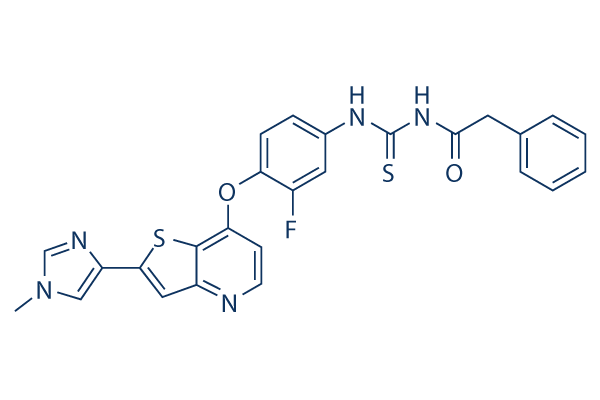research use only
MGCD-265 analog c-Met inhibitor
Cat.No.S1361

Chemical Structure
Molecular Weight: 517.60
Quality Control
| Related Targets | EGFR VEGFR PDGFR FGFR Src MEK CSF-1R FLT3 HER2 c-Kit |
|---|---|
| Other c-Met Inhibitors | Tepotinib Dihexa SGX-523 Foretinib PHA-665752 SU11274 BMS-777607 JNJ-38877605 Tivantinib PF-04217903 |
Cell Culture, Treatment & Working Concentration
| Cell Lines | Assay Type | Concentration | Incubation Time | Formulation | Activity Description | PMID |
|---|---|---|---|---|---|---|
| Sf9 cells | Function assay | Inhibition of GST tagged VEGFR2 expressed in Sf9 cells, IC50=0.01 μM | ||||
| 293T cells | Function assay | Inhibition of TPR-fused Met phosphorylation expressed in human 293T cells by ELISA, IC50=0.05 μM | ||||
| Click to View More Cell Line Experimental Data | ||||||
Solubility
|
In vitro |
DMSO
: 104 mg/mL
(200.92 mM)
Water : Insoluble Ethanol : Insoluble |
Molarity Calculator
|
In vivo |
|||||
In vivo Formulation Calculator (Clear solution)
Step 1: Enter information below (Recommended: An additional animal making an allowance for loss during the experiment)
Step 2: Enter the in vivo formulation (This is only the calculator, not formulation. Please contact us first if there is no in vivo formulation at the solubility Section.)
Calculation results:
Working concentration: mg/ml;
Method for preparing DMSO master liquid: mg drug pre-dissolved in μL DMSO ( Master liquid concentration mg/mL, Please contact us first if the concentration exceeds the DMSO solubility of the batch of drug. )
Method for preparing in vivo formulation: Take μL DMSO master liquid, next addμL PEG300, mix and clarify, next addμL Tween 80, mix and clarify, next add μL ddH2O, mix and clarify.
Method for preparing in vivo formulation: Take μL DMSO master liquid, next add μL Corn oil, mix and clarify.
Note: 1. Please make sure the liquid is clear before adding the next solvent.
2. Be sure to add the solvent(s) in order. You must ensure that the solution obtained, in the previous addition, is a clear solution before proceeding to add the next solvent. Physical methods such
as vortex, ultrasound or hot water bath can be used to aid dissolving.
Chemical Information, Storage & Stability
| Molecular Weight | 517.60 | Formula | C26H20FN5O2S2 |
Storage (From the date of receipt) | |
|---|---|---|---|---|---|
| CAS No. | 875337-44-3 | Download SDF | Storage of Stock Solutions |
|
|
| Synonyms | N/A | Smiles | CN1C=C(N=C1)C2=CC3=NC=CC(=C3S2)OC4=C(C=C(C=C4)NC(=S)NC(=O)CC5=CC=CC=C5)F | ||
Mechanism of Action
| Targets/IC50/Ki |
Met
1 nM
RON
2 nM
VEGFR1
3 nM
VEGFR2
3 nM
VEGFR3
4 nM
Tie-2
7 nM
|
|---|---|
| In vitro |
MGCD-265 is a multi-target inhibitor of receptor tyrosine kinases. MGCD-265 potently inhibits Met, MetY1235D, MetM1250T, VEGFR1, VEGF2, VEGF3, Ron, and Tie2, with IC50 values ranging from 1 nM to 7 nM.
MGCD-265 inhibits cell proliferation both in c-Met-driven tumor cells (MKN45, MNNG-HOS, and SNU-5) and in non-c-Met-driven tumor cells (HCT116 and MDA-MB-231), with IC50 values of 6 nM–30 nM and 1 μM–3 μM, respectively. In serum starved MKN45 cells, MGCD-265 (40 nM–5 μM) effectively inhibits c-Met phosphorylation and its downstream signaling pathways, including Erk, Akt, Stat3, and Fak. MGCD-265 (6 nM–1 μM) also induces apoptosis in MKN45 cells.
|
| In vivo |
In c-Met-driven or non-c-Met-driven mice xenograft models of MKN45, U87MG, MDA-MB-231, COLO205, and A549 tumor cells, MGCD-265 (20 mg/kg–60 mg/kg) inhibits tumor growth and c-Met signaling. MGCD-265 (40 mg/kg) also downregulates genes involved in angiogenesis, including VEGF and IL-8, both in tumor and plasma of mice with U87MG xenograft. MGCD-265 also inhibits the plasma level of shed-Met.
|
References |
|
Clinical Trial Information
(data from https://clinicaltrials.gov, updated on 2024-05-22)
| NCT Number | Recruitment | Conditions | Sponsor/Collaborators | Start Date | Phases |
|---|---|---|---|---|---|
| NCT02544633 | Completed | Non-Small Cell Lung Cancer |
Mirati Therapeutics Inc. |
October 2015 | Phase 2 |
| NCT01930006 | Completed | Advanced Malignancies |
Mirati Therapeutics Inc. |
August 2013 | Phase 1 |
| NCT02117245 | Completed | Healthy |
Mirati Therapeutics Inc. |
December 2011 | -- |
| NCT00975767 | Terminated | Advanced Malignancies Non-small Cell Lung Cancer |
Mirati Therapeutics Inc. |
August 2009 | Phase 1 |
Tech Support
Tel: +1-832-582-8158 Ext:3
If you have any other enquiries, please leave a message.






































